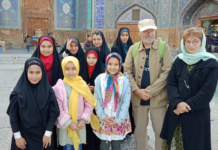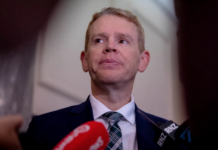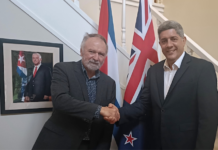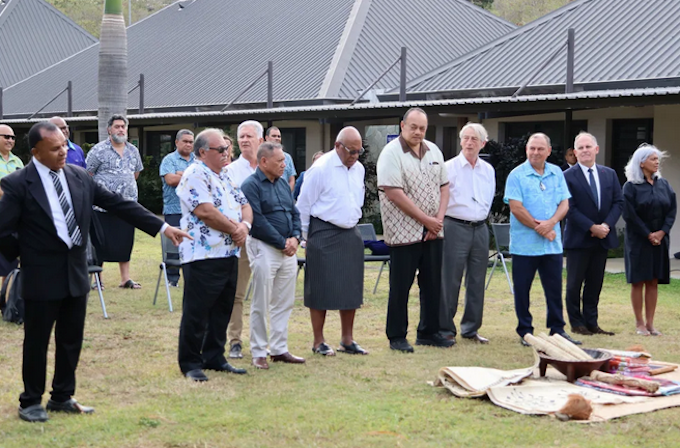
By Lydia Lewis, RNZ Pacific presenter/Bulletin editor
A three-day fact-finding mission, headed by three Pacific leaders, has wrapped up in Nouméa, and New Caledonia’s President Louis Mapou says the French territory is at a “turning point”.
The semi-autonomous Pacific territory has been riddled with violent unrest since May.
While tensions have reportedly eased for now, the main political decision-making body for the Pacific region has been in Nouméa this week on a “strictly observational” but “critical mission”.
- READ MORE: Pacific leaders’ troika begins New Caledonia fact-finding mission
- Other Kanaky New Caledonia reports
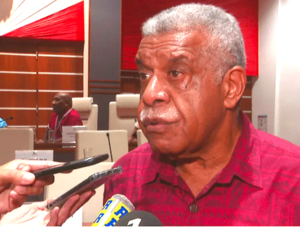
Territorial President Louis Mapou told reporters why the Pacific Islands Forum (PIF) “troika -plus” visit was so important.
“They have a shared intention with government members, drawing on their own experience in the region: the Cook Islands, which are in free association with New Zealand; Tonga, a country that was never colonised; and the Solomon Islands, which have experienced interethnic conflicts in the northern part, where youth played a significant role,” he said.
“And finally, Fiji, which gained independence, decided to withdraw from the Commonwealth, and is now re-evaluating its connection with the British Crown. So, they willingly shared their own history.
“They pointed out that in each of these histories, it was often the internal decisions of the populations involved that ultimately shaped the choices made about their country’s future.”
What a pleasant honour to have Hon. Prime Minister @slrabuka welcomed by @LegionEtrangere & @RSMA_NC , writing a poem about his visit in New-Caledonia as a member of the @ForumSEC high level Troïka-Plus information mission . pic.twitter.com/HVVoebqPfA
— Véronique Roger-Lacan (@rogerlacanv) October 28, 2024
Hope and perspective
Local government spokesperson Charles Wea said the visit brought hope and perspective.
“It is important that that people from New Caledonia can arrive to express their views, and also the political perspectives, in terms of political future,” he said.
“The process of decolonisation, for example, which is quite a major subject topic that will be in the discussion with a mission”
Tongan Prime Minister Hu’akavameiliku Siaosi Sovaleni led the PPIF troika-plus delegation — Rabuka was the “plus” factor.
“We are not there to judge you or to tell them what to do right now. It is a preliminary visit. So, basically, we just want to listen.”
While it is a fact-finding mission, there are some indisputable facts, such as New Caledonia being on the United Nations Decolonisation List.
Tuvalu MP Simon Kofe has expressed his thoughts on this.
Pacific ‘needs to support decolonisation’
“My position is for independence, we need to continue supporting the decolonisation of the Pacific,” Kofe told RNZ Pacific.
Hu’akavameiliku’s views were somewhat more diplomatic.
“I do believe that there is a way of having some sovereignty and control of your country. There are various models in the Pacific. You have Niue and Cook Islands. Then you have American Samoa.
“We are not the ones who will tell [New Caledonia] what is working and what is not. We respect their sovereignty.”
But amid the politicking, a Kanak leader from the Protestant Church of Kanaky New Caledonia, Billy Wetewea, said people were struggling.
In particular, the indigenous population, who were battling inequities in education, employment and health, he said.
“The destruction that the youth have made since May, was a kind of expression of the frustration towards all of these social injustices,” he said.
“We are fighting for our humanity. So, it’s for the dignity of our humanity, and our humanity is the humanity of everyone.”
‘Neither marginalised nor mistreated’
The pro-France loyalists, however, have a different perspective.
“Contrary to what some separatists suggest, the Kanak people are neither marginalised nor mistreated,” they said in a statement.
“On the contrary, [Kanaky people are] one of the most advantaged in our Oceanian region.”
Wea said the Pacific leaders had the chance to hear from all sides involved in the unrest.
The findings will be presented to the 18 Pacific leaders at next year’s leaders meeting.
This article is republished under a community partnership agreement with RNZ.






